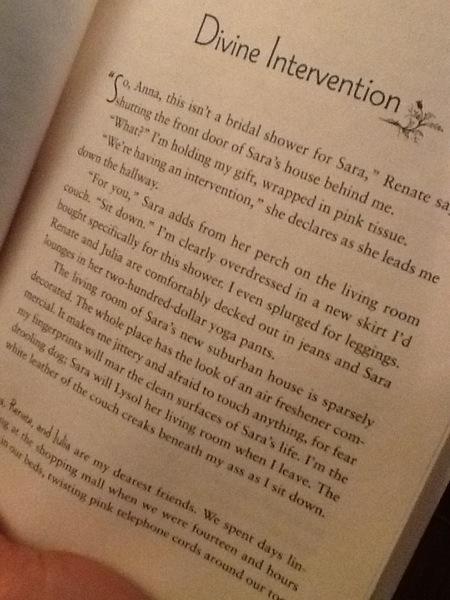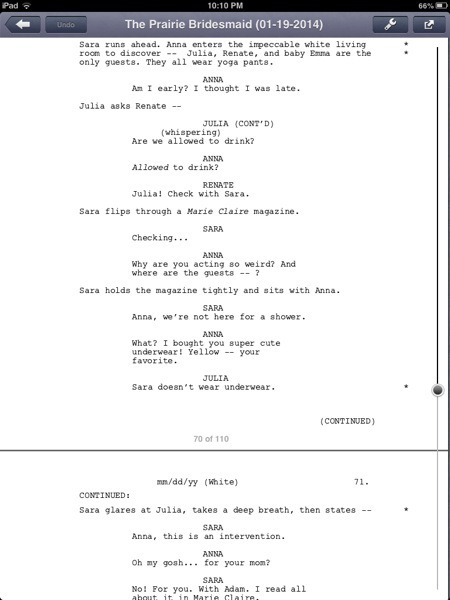The Surgery of Adaptation.
My screenwriting partner Rebecca and I have just delivered another draft of the screen adaptation for The Prairie Bridesmaid.
We’ll launch into some more revisions soon, but I’ve had time to reflect on the whole experience. It’s a lot like performing a variety of surgical procedures on a close family member. In my case, with very little training or experience.
Vasectomy anyone? I’m really good at it now!
The BOOK:
You write a book. You spend so much time with it that it becomes your family. When you finally manage to produce an early draft you look at it in awe— the way you do your child. You cannot believe that you have created this thing! And then the work of raising it and developing it kicks in, you yell and get mad at it and sometimes banish it to another room because it’s been difficult and obstinate and quite frankly, everyone just needs a Time Out. Then you pull it out again weeping, telling it how much you love it.
Then it turns into the spouse you’ve been married to for so, so long; you keep trying to shape it and make it better but it refuses to mold to your vision. Sometimes you want to get away from it, only to realize you are utterly lost and empty and destroyed without it.
Eventually you put out this work, this book that is so close to you. It owns your heart, and like it or not, you and it are inextricably bound for life. Like family.
The ADAPTATION:
The book is optioned for film.
Every. Writers’. Dream.
Would you like to write the adaptation?
Sure. Sounds fun! How hard can this be, really? We already have the story. We just have to alter the form a little, right? (Clearly, I’ve blocked out the movie Adaptation)
There is reason why every person on planet earth, at least once in their life, has uttered the words the book was way better. And why every screenwriter who has ever worked on an adaptation wants to spine punch anyone who has eer said that.
Adapting a book to film is fucking hard and it’s impossible to ensure every readers’ vision of the book is respected.
As a novelist, I had a leisurely several hundred pages to allow the story to meander and unfold, often taking the reader on lengthy detours inside the heads and hearts of the characters.

So, the challenge of screenwriting is to take a 300 pages of dense, flowery, text and turn it into 110 (our producer would be much happier if it were 100) pages of mainly concise, no bullshit dialogue…with a few visual references.

I remember wayyy back our first story editor, after reading our first draft, telling us you’ve done a really lovely job of honouring the book, but this is a terrible movie!
Read a crapload of screenwriting books. Let the hacking and slashing begin.
What do you mean there’s too many characters?
What do you mean it’s too expensive to shoot a scene in an airplane?
What do you mean we can’t use the word fuck more than 3 times in a PG13 movie? We used it 67 times? Really?
What do you mean The Midpoint of the movie has to happen on page 55? What is a midpoint, anyway?
The process of adapting is like being given a whole bunch of sharp medical implements, an operating table with your nearest and dearest family member lying on it. You are handed a list of lengthy surgeries to perform with a rigorous deadline. 3…2…1…GO!
circumcision,
vasectomy
tummy tuck, face lift, implants
Find and take out all non-essential organs (appendix, gallbladder, kidney, one lung, one ovary, onetesticle) (the patient is a hermaphrodite)
Locate the heart, make it bigger and make it glow in the dark.
Make the patient shorter; he’s too tall. And he better be funnier when he wakes up!
Oh, and make him into a unicorn.
Once you get past the initial horror of it all, and you get used to the sharp tools, and figure out how to prevent the patient from bleeding out…it actually becomes pretty fun. With each surgery you get a little better, the script gets a little better and you realize you can even drink while operating.
We delved deep into the core of the story, dissected the various plot strands, figured out which characters to kill, made the arc of the story clean and succinct, defined our protagonist’s journey and figured out what the hell she wants.
Even though this is one of the hardest writing projects I've ever done, I’ve mostly really loved the whole process; I’ve learned a lot. I’ve had to adhere to a rigid structure and meet deadlines; two things that generally elude me. And probably the best part is that I am not alone! Each draft is a collaborative process that involves more than just me, a bottle of Malbec and my Macbook.
I get to work with all sorts of people who know how scripts are supposed to work and who are equally passionate about the project – our producer, director, actors.
And of course, my writing partner, Rebecca Gibson. She’s been dreamy to work with. She always shows up with coffee, she always looks good at 6 am! And she’s a killer writer. I’d probably still be trying to figure out the first scene left to my own devices.
Rebecca and I still have some minor surgeries to perform on our script. But we’ve done a gazillion drafts of this beast and it feels like we are getting really close to a story we really want to see on film, a story fans of the book will want to see on film.
People keep asking me when the movie is coming out. I don’t know when the damn movie is coming out! I don’t know when or if it’s getting made. I stopped worrying about that a long time ago. We get paid to work our butts off to hack and slash the shit out of that book, make it into a really solid script. If we do our jobs, I think the rest will fall into place.
Will I do this again? Who knows? But I will never flippantly say the book was better when I see an adapted film after intimately knowing and conducting the surgeries of adaptation.
Hey, which are your favourite book to film adaptations? I’d love to hear about them!
